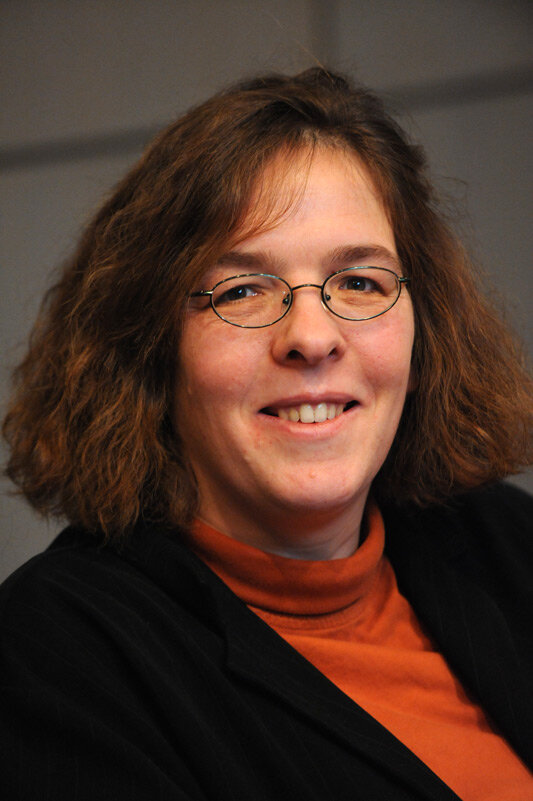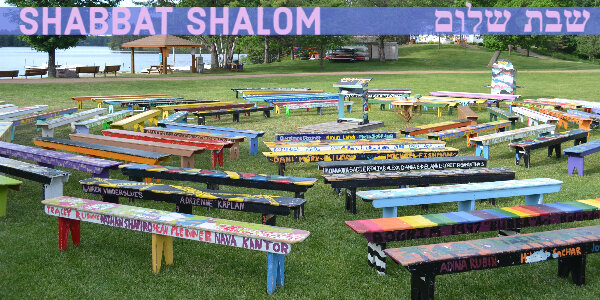Rabbi Gesa Ederberg is the rabbi of the Oranienburger Strasse Synagogue in Berlin, Germany, and after dreaming about it for many, many years, she finally spent last summer at Camp Ramah in Wisconsin, bringing several campers from her community. They were all looking forward to coming again this summer! Gesa is the founder of Masorti Germany, which runs a preschool/kindergarten and a day school. She earned rabbinical ordination from the Schechter Institute of Jewish Studies in Jerusalem.
Reflections on Parashat Eikev
by Rabbi Gesa Ederberg
וְאָכַלְתָּ, וְשָׂבָעְתָּ–וּבֵרַכְתָּ אֶת-יְהוָה אֱלֹהֶיךָ, עַל-הָאָרֶץ הַטֹּבָה אֲשֶׁר נָתַן-לָךְ
“You shall eat, be satisfied and bless your God for the good land that God has given you. (Devarim 8:10).
This verse from Parashat Eikev is the source for the mitzvah of Birkat Hamazon, saying a blessing after eating. At first glance, we consider this the most natural verse: We eat the fruits of the land, and then give praise to God who created them.
But remember where we are at this point in the Torah: Moses is talking to the Israelites. They are still in the desert, they’ve been eating nothing but manna for 40 years, and they have been complaining constantly about it! And the “good land” is still just a promise, not yet a reality.
Saying Birkat Hamazon at the end of a meal is one of my favorite moments at camp, with all the hand motions, banging on the table and silly additions – it’s a lot of fun. Campers of all ages quickly learn the words and melodies by heart, but did we ever look closely at the text? Indeed, it is a summary of the core messages of Judaism!
It consists of four sections, each concluding with a b’racha, a blessing. First let’s examine their origin. The Talmud (Berakhot 48b) says:
From where is it derived that Birkat Hamazon is from the Torah? As it is stated: “And you shall eat and be satisfied, and you shall bless the Lord, your God, for the good land that God has given you.” The gemara explains:
“And you shall bless” – that is the blessing of: Who feeds all. (hazan et hakol)
“For the land” – that is the blessing: Of the land. (al ha’aretz)
”Good” – that is the blessing of: Who builds Jerusalem. (boneh Yerushalayim)
“That God has given you” – that is the blessing of: Who is good and does good. (hatov v’hametiv)
The first paragraph broadens our view, including the entire world and talking about God, the creator who nourishes us all.
The second paragraph gives thanks for the Land of Israel – and for all the good that God has done throughout the history of the Jewish people.
The third paragraph is looking into the future, to promises not yet fulfilled, the coming of mashiach and the final rule of God.
The fourth paragraph – probably added later – is praising God in an overarching way.
Creation, God’s history with the people of Israel, and hopes for a future redemption are the three central themes not only of Birkat Hamazon, but also for the blessings surrounding the shema in our daily prayer. In the morning we start with yotzer or, praising God for creating light (and if I close my eyes I can see the sun rising in the morning over camp). In the evening we praise God for creating darkness, the moon and the stars, and in ahavah rabbah, we praise God for loving Israel, and in the blessing after the shema, “ga’al yisrael”, we remember being rescued from Egypt and express our hope for future redemption.
Every time we sit together around a table, enjoy a meal and conclude it with Birkat Hamazon – as a family, as a group of friends, or as an eidah at camp – we stretch our imagination and see ourselves at this turning point: Having wandered through the desert, about to enter the Land of Israel, looking back at the good things God has done for us and hoping for more to come.







